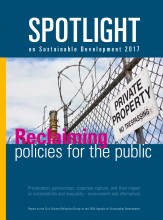By Cecilia Alemany, Development Alternatives with Women for a New Era (DAWN) and Anita Gurumurthy, IT for Change (ITfC).
"People worry that computers will get too smart and take over the world, but the real problem is that they are too stupid and they’ve already taken the world." [fn] Domingos (2017), p. 286. [/fn]
“The Data Revolution” has been promoted as a vital tool to help to achieve the SDGs or, at least, to better measure progress. Having access to [...]









